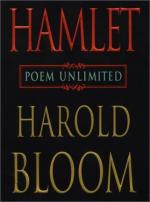|
This section contains 3,897 words (approx. 13 pages at 300 words per page) |

|
SOURCE: "The Criticism of Harold Bloom: Judgement and History," in Centrum, Vol. 6, No. 1, Spring, 1978, pp. 32-42
In the following essay, Arac examines Bloom's earlier works and traces the development of his theoretical stance in order to locate Bloom's "concerns and gestures in the continuing contests of literary criticism."
I
Of our critics who have defined their identities in the postwar years, Harold Bloom is one of the most useful. I have learned much from Bloom about reading the poems of the last two hundred years, but such individual readings only extend New Criticism, which Bloom has helped in other ways to bring us beyond. Northrop Frye's archetypal criticism made the totality of literature, rather than the individual poem, the unit of effective wholeness, but Bloom challenges both Frye and New Criticism in opening for exploration a middle range, a human scale: individual poets rather than single poems or...
|
This section contains 3,897 words (approx. 13 pages at 300 words per page) |

|


